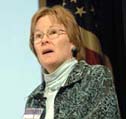 |
   |
|
December 12, 2008
Retreat Refreshes Behavioral, Social Sciences
 Dr. Christine Bachrach
Dr. Christine Bachrach
Dr. Christine Bachrach, acting director of the Office of Behavioral and Social Sciences Research, wanted just one thing out of the first-ever day-long retreat for NIH’s widely dispersed community of behavioral and social scientists, held Nov. 12 at Natcher Bldg.
December 12, 2008
CBT4CBT
New Hope for Treatment of Addiction
 Dr. Kathleen Carroll
Dr. Kathleen Carroll
Drug addiction is notoriously tough to treat, but now research is showing a fresh way to tackle the problem. It’s called computer-based training for cognitive-behavioral therapy (CBT4CBT)
OBSSR’s Mabry Wins with Systems Analysis Team
 OBSSR’s Mabry Wins with Systems Analysis Team
OBSSR’s Mabry Wins with Systems Analysis Team
More News >>
|
  |
|
January 28-29, 2009 Dissemination and Implementation Conference
February 9, 2009, 10:00 – 11:00 AM
Stigma: Lessons & New Directions from a Decade of Research on Mental Illness
July 12-24, 2009
OBSSR/NIH Summer Training Institute on Randomized Clinical Trials Involving Behavioral Interventions
May 3-8, 2009
Institute on Systems Science and Health
May 22-25, 2009
Gene-Environment Interplay in Stress and Health at the Association for Psychological Science 21st Annual Convention, San Francisco, CA
More Events >>
|
|
|
 |
 |
 |
 |
|
Home > News and Events > Conferences
|
2004 Summer Institute on Design and Conduct of
Randomized Clinical Trials |
NIH Summer Institute
The Design and Conduct of Qualitative and Mixed-Method Research in Social Work and Other Health Professions
August 4 -8, 2004
|
Table of Contents
 To provide a thorough grounding in the design and conduct of qualitative and mixed
method research to social work researchers and other health professionals interested in
developing competence in the planning, design, and execution of these techniques and
become more successful in the NIH extramural research program.
To provide a thorough grounding in the design and conduct of qualitative and mixed
method research to social work researchers and other health professionals interested in
developing competence in the planning, design, and execution of these techniques and
become more successful in the NIH extramural research program.
The course will enable participants to:
- Understand the strengths of qualitative and mixed methods and their application to practice- and policy-relevant research.
- Describe the role of theories and conceptual schemas in carrying out qualitative research
- Develop skills in design, sampling, interviewing and field observation
- Develop skills in coding and interpretation of qualitative data
- Learn about and use strategies for rigor in qualitative design and analysis
- Understand and contrast mixed methods designs and their applications
- Develop skills in evaluation research using ‘focused’ qualitative methods
- Learn about the process of submission and review of NIH grant proposals using qualitative and mixed methods approaches
Top
Wednesday, August 4 – Sunday, August 8, 2004
The Institute will be held in the Greater Washington D.C. Metropolitan Area
In May 2003, the National Institutes of Health developed the first trans-institute
plan for social work research. This document, dubbed the NIH Plan for Social Work
Research, made a series of recommendations to further enhance this area of research
in the extramural program. One of the proposed initiatives is for NIH to conduct a
Summer Institute on Social Work Research. This initiative would focus in 2004 on
qualitative and mixed research methods–one of the frequently mentioned research
infrastructure and training needs in this field. Specifically, the NIH plan proposes to:
- Develop and implement an NIH Summer Institute on Social
Work Research offering new researchers intensive exposure to issues and
challenges in the field of social work research. The program of the Summer
Institute would include lectures, seminars, and small group discussions in
research design relative to social work as it relates to health, discussion
sessions on methodological approaches and interventions, and consultation on
the development of research interests and advice on preparing and submitting
research grant applications to the NIH.
Top
This institute is designed for those interested in intermediate and advanced training
in qualitative research and mixed methods, i.e., those who have had coursework and/or
prior experience conducting qualitative or mixed methods research. Our approach will
be multi-disciplinary and focus upon the most commonly used methods such as ethnography,
grounded theory and narrative approaches. Use of QDA software and computerized
applications will be covered, but are not a requirement for participation. The format
will be both didactic and hands-on.
Institute Co-Chairs
Deborah K. Padgett ( New York University ) and
Debbie Gioia ( University of Michigan )
Top
Faculty/Presenters
*In addition to formal presentations, there will be breakout group exercises, daily
lunch-time group meetings (designing a mock mixed methods proposal) and group presentations
of their proposals on Saturday afternoon - followed by a gala reception and a Poetry Slam
competition (between groups). Details to follow...stay tuned!
Recall that participants are expected to attend all sessions of the Institute. Thank you
Top
Deborah K. Padgett
NIH Staff Panel: Denise Juliano-Bult, Peggy Murray, and Jerry Flanzer
Robert Weller
Kim Hopper
Tazuko Shibusawa and Ellen Lukens
*(Adobe Acrobat is required for viewing presentations)
Priority will be given to individuals who fit one of the following categories:
Recent completion of the doctorate (within past two years) and seeking to pursue further
research using qualitative and/or mixed methods;
- Two or more years since completion of the doctorate and substantial work (e.g., pilot study)
toward preparation of a grant proposal using qualitative or mixed methods;
- Experienced quantitative researchers seeking to expand their methods expertise to include
qualitative and mixed methods.
Beyond these eligibility criteria we are seeking researchers who will clearly benefit from
an in-depth exposure to qualitative and mixed methods in their research. Those who have
extensive research experience will be considered after more junior investigators have been
evaluated. Preference is also given to individuals who are not employees of NIH. While
we will consider and may even accept “exceptional” applicants who do not meet these criteria,
priority will go to those who do.
Due to the limited number of spaces in the course, applicants must be citizens or non-citizen
nationals of the United States, or must have been lawfully admitted to the United States for
permanent residence (i.e., possess a currently valid Alien Registration Receipt Card I-551, or
other legal verification of such status). Women, minorities, and individuals with disabilities
are encouraged to apply.
Reasonable Accommodations: If you require reasonable accommodations for disabilities to
participate in this activity, please contact Ms. Heather Thompson on (301) 897-2789 (ext 132)
between 9:00 AM and 5:00 PM Eastern Time, or via e-mail at
hthompson@thehillgroup.com at least
60 business days before the course begins.
Top
50 Maximum; A minimum of 20% of the available slots will be reserved for those outside of the social work field.
Participants pay for their own travel to and from the Summer Institute.
There are no additional fees–room and board and study materials will be covered.
Applicants must submit: 1) a curriculum vitae; 2) a signed letter of support from
your Dean or Department Chair; 3) a Personal Statement describing your research and
career interests and how this course will benefit them (maximum 2 pages).
- Applications must be received no later than March 31, 2004.
Click here to download the application form
(in Adobe PDF). The Summer Institute
Planning Committee will select participants and notify them in mid-May.
- Complete and mail 5 copies of the application form, with supporting materials, to:
- Summer Institute for Social Work and Other Health Professions
- c/o The Hill Group
- 6903 Rockledge Drive, Suite 540
- Bethesda , MD 20817
For additional general information about the Summer Institute, please review the Frequently Asked Questions (FAQs).
For questions about the course content, please contact:
If you have questions about the logistics of the course, please contact:
Ms. Heather Thompson on (301) 897-2789 (ext. 132); e-mail:
hthompson@thehillgroup.com
Top
|
|
|
 |
 |
 |
 |
|
|
 |